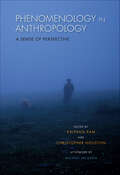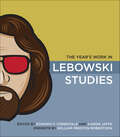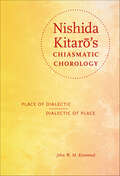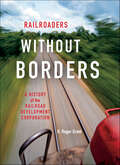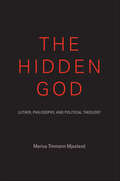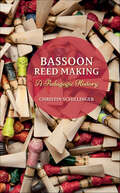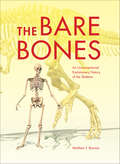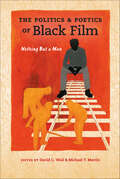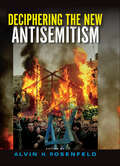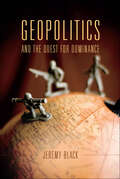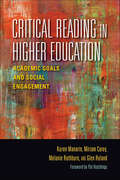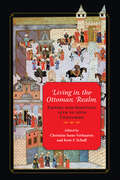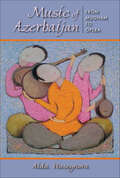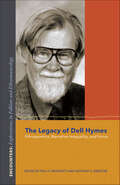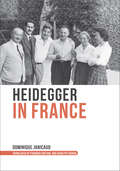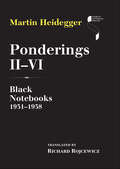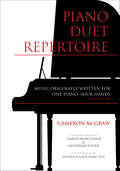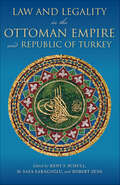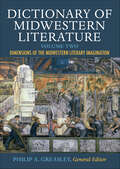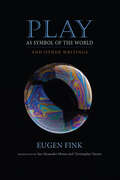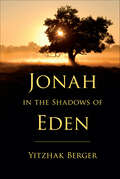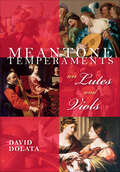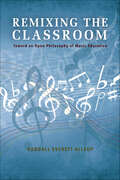- Table View
- List View
Phenomenology in Anthropology: A Sense of Perspective
by Michael JacksonThis volume explores what phenomenology adds to the enterprise of anthropology, drawing on and contributing to a burgeoning field of social science research inspired by the phenomenological tradition in philosophy. Essays by leading scholars ground their discussions of theory and method in richly detailed ethnographic case studies. The contributors broaden the application of phenomenology in anthropology beyond the areas in which it has been most influential—studies of sensory perception, emotion, bodiliness, and intersubjectivity—into new areas of inquiry such as martial arts, sports, dance, music, and political discourse.
The Year's Work in Lebowski Studies (The Year's Work)
by William Preston RobertsonA massive underground sensation, The Big Lebowski has been hailed as the first cult film of the internet age. In this book, 21 fans and scholars address the film's influences—westerns, noir, grail legends, the 1960s, and Fluxus—and its historical connections to the first Iraq war, boomers, slackerdom, surrealism, college culture, and of course bowling. The Year's Work in Lebowski Studies contains neither arid analyses nor lectures for the late-night crowd, but new ways of thinking and writing about film culture.
Nishida Kitaro's Chiasmatic Chorology: Place of Dialectic, Dialectic of Place (World Philosophies)
by John W. KrummelNishida Kitaro (1870–1945) is considered Japan's first and greatest modern philosopher. As founder of the Kyoto School, he began a rigorous philosophical engagement and dialogue with Western philosophical traditions, especially the work of G. W. F. Hegel. John W. M. Krummel explores the Buddhist roots of Nishida's thought and places him in connection with Hegel and other philosophers of the Continental tradition. Krummel develops notions of self-awareness, will, being, place, the environment, religion, and politics in Nishida's thought and shows how his ethics of humility may best serve us in our complex world.
Railroaders without Borders: A History of the Railroad Development Corporation (Railroads Past and Present)
by H. Roger GrantFor over 25 years, the creatively led Railroad Development Corporation (RDC) has rejuvenated a series of down-and-out and even defunct railroads. Launched in 1987 by Henry Posner III, this investment and management company has demonstrated that it is possible both to have a conscience and to earn a profit in today's railroad industry. With ventures on four continents, RDC has created an admirable record of long-term commitments, respect for local cultures, and protection of the public interest. H. Roger Grant presents a firsthand look at this unique business operation and its triumphs and disappointments.
The Hidden God: Luther, Philosophy, and Political Theology (Philosophy of Religion)
by Marius Timmann MjaalandIn this phenomenological reading of Luther, Marius Timmann Mjaaland shows that theological discourse is never philosophically neutral and always politically loaded. Raising questions concerning the conditions of modern philosophy, religion, and political ideas, Marius Timmann Mjaaland follows a dark thread of thought back to its origin in Martin Luther. Thorough analyses of the genealogy of secularization, the political role of the apocalypse, the topology of the self, and the destruction of metaphysics demonstrate the continuous relevance of this highly subtle thinker.rabbi
Bassoon Reed Making: A Pedagogic History
by Christin SchillingerWithheld by leading pedagogues in an effort to control competition, the art of reed making in the early 20th century has been shrouded in secrecy, producing a generation of performers without reed making fluency. While tenets of past decades remain in modern pedagogy, Christin Schillinger details the historical pedagogical trends of bassoon reed making to examine the impact different methods have had on the practice of reed making and performance today. Schillinger traces the pedagogy of reed making from the earliest known publication addressing bassoon pedagogy in 1687 through the publication of Julius Weissenborn's Praktische Fagott-Schule and concludes with an in-depth look at contemporary methodologies developed by Louis Skinner, Don Christlieb, Norman Herzberg, and Lewis Hugh Cooper. Aimed at practitioners and pedagogues of the bassoon, this book provides a deeper understanding of the history and technique surrounding reed-making craft and instruction.
The Bare Bones: An Unconventional Evolutionary History of the Skeleton (Life of the Past)
by Matthew F. BonnanWhat can we learn about the evolution of jaws from a pair of scissors? How does the flight of a tennis ball help explain how fish overcome drag? What do a spacesuit and a chicken egg have in common? Highlighting the fascinating twists and turns of evolution across more than 540 million years, paleobiologist Matthew Bonnan uses everyday objects to explain the emergence and adaptation of the vertebrate skeleton. What can camera lenses tell us about the eyes of marine reptiles? How does understanding what prevents a coffee mug from spilling help us understand the posture of dinosaurs? The answers to these and other intriguing questions illustrate how scientists have pieced together the history of vertebrates from their bare bones. With its engaging and informative text, plus more than 200 illustrative diagrams created by the author, The Bare Bones is an unconventional and reader-friendly introduction to the skeleton as an evolving machine.
The Politics & Poetics of Black Film: Nothing But a Man (Studies in the Cinema of the Black Diaspora)
by Michael T. Martin David C. WallWritten and directed by two white men and performed by an all-black cast, Nothing But a Man (Michael Roemer, 1964) tells the story of a drifter turned family man who struggles with the pressures of small-town life and the limitations placed on him and his community in the Deep South, an area long fraught with racism. Though unmistakably about race and civil rights, the film makes no direct reference to the civil rights movement. Despite this intentional absence, contemporary audiences were acutely aware of the social context for the film's indictment of white prejudice in America. To help frame and situate the film in the context of black film studies, the book gathers primary and secondary resources, including the original screenplay, essays on the film, statements by the filmmakers, and interviews with Robert M. Young, the film's producer and cinematographer, and Khalil Gibran Muhammad, the Director of the Schomburg Center for Research in Black Culture.
Deciphering the New Antisemitism (Studies in Antisemitism)
by Alvin H. RosenfeldDeciphering the New Antisemitism addresses the increasing prevalence of antisemitism on a global scale. Antisemitism takes on various forms in all parts of the world, and the essays in this wide-ranging volume deal with many of them: European antisemitism, antisemitism and Islamophobia, antisemitism and anti-Zionism, and efforts to demonize and delegitimize Israel. Contributors are an international group of scholars who clarify the cultural, intellectual, political, and religious conditions that give rise to antisemitic words and deeds. These landmark essays are noteworthy for their timeliness and ability to grapple effectively with the serious issues at hand.
Geopolitics and the Quest for Dominance
by Jeremy BlackHistory and geography delineate the operation of power, not only its range but also the capacity to plan and the ability to implement. Approaching state strategy and policy from the spatial angle, Jeremy Black argues that just as the perception of power is central to issues of power, so place, and its constraints and relationships, is partly a matter of perception, not merely map coordinates. Geopolitics, he maintains, is as much about ideas and perception as it is about the actual spatial dimensions of power. Black's study ranges widely, examining geography and the spatial nature of state power from the 15th century to the present day. He considers the rise of British power, geopolitics and the age of Imperialism, the Nazis and World War II, and the Cold War, and he looks at the key theorists of the latter 20th century, including Henry Kissinger, Francis Fukuyama and Samuel P. Huntington, Philip Bobbitt, Niall Ferguson, and others.
Critical Reading in Higher Education: Academic Goals and Social Engagement (Scholarship of Teaching and Learning)
by Glen Ryland Melanie Rathburn Karen Manarin Miriam CareyFaculty often worry that students can't or won't read critically, a foundational skill for success in academic and professional endeavors. "Critical reading" refers both to reading for academic purposes and reading for social engagement. This volume is based on collaborative, multidisciplinary research into how students read in first-year courses in subjects ranging from scientific literacy through composition. The authors discovered the good (students can read), the bad (students are not reading for social engagement), and the ugly (class assignments may be setting students up for failure) and they offer strategies that can better engage students and provide more meaningful reading experiences.
Living in the Ottoman Realm: Empire and Identity, 13th to 20th Centuries
by Kent F. Schull Christine Isom-VerhaarenLiving in the Ottoman Realm brings the Ottoman Empire to life in all of its ethnic, religious, linguistic, and geographic diversity. The contributors explore the development and transformation of identity over the long span of the empire's existence. They offer engaging accounts of individuals, groups, and communities by drawing on a rich array of primary sources, some available in English translation for the first time. These materials are examined with new methodological approaches to gain a deeper understanding of what it meant to be Ottoman. Designed for use as a course text, each chapter includes study questions and suggestions for further reading.
Music of Azerbaijan: From Mugham to Opera (Ethnomusicology Multimedia)
by Aida HuseynovaThis book traces the development of Azerbaijani art music from its origins in the Eastern, modal, improvisational tradition known as mugham through its fusion with Western classical, jazz, and world art music. Aida Huseynova places the fascinating and little-known history of music in Azerbaijan against the vivid backdrop of cultural life under Soviet influence, which paradoxically both encouraged and repressed the evolution of national musics and post-Soviet independence. Inspired by their neighbors to the East and West, Azerbaijani musicians enjoyed a period of remarkable creativity, composing and performing the first opera and the first ballet in the Muslim East, establishing the region's first Opera and Ballet Theater and Conservatory of Music, and discovering ways to merge the modal lyricism of mugham with the rhythmic dynamics of jazz. Drawing on previously unstudied archives, letters, and documents as well as her experience as an Azerbaijani musician and educator, Huseynova shows how Azerbaijani musical development was not a product of Soviet cultural policies but rather grew from and reflected deep and complex cultural processes.
The Legacy of Dell Hymes: Ethnopoetics, Narrative Inequality, and Voice (Encounters: Explorations In Folklore And Ethnomusicology Ser.)
by Anthony K. Webster Paul V. KroskrityThe accomplishments and enduring influence of renowned anthropologist Dell Hymes are showcased in these essays by leading practitioners in the field. Hymes (1927–2009) is arguably best known for his pioneering work in ethnopoetics, a studied approach to Native verbal art that elucidates cultural significance and aesthetic form. As these essays amply demonstrate, nearly six decades later ethnopoetics and Hymes's focus on narrative inequality and voice provide a still valuable critical lens for current research in anthropology and folklore. Through ethnopoetics, so much can be understood in diverse cultural settings and situations: gleaning the voices of individual Koryak storytellers and aesthetic sensibilities from century-old wax cylinder recordings; understanding the similarities and differences between Apache life stories told 58 years apart; how Navajo punning and an expressive device illuminate the work of a Navajo poet; decolonizing Western Mono and Yokuts stories by bringing to the surface the performances behind the texts written down by scholars long ago; and keenly appreciating the potency of language revitalization projects among First Nations communities in the Yukon and northwestern California. Fascinating and topical, these essays not only honor a legacy but also point the way forward.
Heidegger in France (Studies in Continental Thought)
by Dominique JanicaudDominique Janicaud claimed that every French intellectual movement—from existentialism to psychoanalysis—was influenced by Martin Heidegger. This translation of Janicaud's landmark work, Heidegger en France, details Heidegger's reception in philosophy and other humanistic and social science disciplines. Interviews with key French thinkers such as Françoise Dastur, Jacques Derrida, Éliane Escoubas, Jean Greisch, Philippe Lacoue-Labarthe, Jean-Luc Marion, and Jean-Luc Nancy are included and provide further reflection on Heidegger's relationship to French philosophy. An intellectual undertaking of authoritative scope, this work furnishes a thorough history of the French reception of Heidegger's thought.
Congratulations on Your Martyrdom!
by Zachary Tyler VickersSearing, troubling, and funny, these revolutionary, linked stories flit and dart among the shadows of small town life, and the touching and heartbreaking characters that occupy it. Employees use roadkill instead of faux pelts during a build-a-critter battle for mall supremacy. Former band geeks are harassed with mutilated musical instruments and then murdered. The collection is haunted by allusions to a fatal cannonball jump that crescendos in the explosive final story. An extraordinary addition to the canon of gonzo fiction, Congratulations on Your Martyrdom! introduces Zachary Tyler Vickers as an exciting new author whose unflinching prose grabs you and won't let go.
Little Indiana: Small Town Destinations
by Jessica NunemakerWhere was James Dean's hometown? What do A. J. Foyt, Mario Andretti, and Al Unser have in common besides winning the Indianapolis 500? Where was the world's first theme park? Find these answers and more in Little Indiana: Small Town Destinations. Featuring towns of 15,000 or fewer inhabitants, Little Indiana explores where to eat, stay, play, and shop in over 90 small towns. After six years of traveling the state in search of amazing local experiences, blogger and TV host Jessica Nunemaker shares a treasure trove of what to expect in Hoosier small towns. Perfect for any length of excursion—day or weekend—the book is organized by region and town and provides travelers easy access to information found nowhere else. From wineries to antique shops, alpaca farms to chocolate stores, unique attractions are awaiting discovery. Full-color images showcase specialty stores, mouth-watering meals, and exciting attractions tucked off the beaten path. Proof that there's always something to do in a small town, this book is the perfect way to kick-start your next Indiana adventure!
Ponderings II–VI: Black Notebooks, 1931–1938 (Studies in Continental Thought)
by Martin HeideggerPonderings II–VI begins the much-anticipated English translation of Martin Heidegger's "Black Notebooks." In a series of small notebooks with black covers, Heidegger confided sundry personal observations and ideas over the course of 40 years. The five notebooks in this volume were written between 1931 and 1938 and thus chronicle Heidegger's year as Rector of the University of Freiburg during the Nazi era. Published in German as volume 94 of the Complete Works, these challenging and fascinating journal entries shed light on Heidegger's philosophical development regarding his central question of what it means to be, but also on his relation to National Socialism and the revolutionary atmosphere of the 1930s in Germany. Readers previously familiar only with excerpts taken out of context may now determine for themselves whether the controversy and censure the "Black Notebooks" have received are deserved or not. This faithful translation by Richard Rojcewicz opens the texts in a way that captures their philosophical and political content while disentangling Heidegger's notoriously difficult language.
Piano Duet Repertoire: Music Originally Written for One Piano, Four Hands (Indiana Repertoire Guides)
by Cameron McGrawSince the 1981 publication of the first edition, Cameron McGraw's Piano Duet Repertoire has been a trusted guide for duet performers. This second edition, edited and substantially expanded by Christopher and Katherine Fisher, brings the volume into the 21st century, adding over 500 new or updated composer entries and nearly 1,000 new work entries to the volume, a testament to the renewed interest in piano duet playing. Entries are arranged alphabetically by composer and include both pedagogical and concert repertoire. The annotations and the grade-level indications provide piano teachers a wealth of instructional guidance. The book also contains updated appendices listing collections and duet works with voice and other instruments. This new edition features a title index and a list of composers by nationality, making it a convenient and indispensable resource.
Law and Legality in the Ottoman Empire and Republic of Turkey
by Kent F. Schull Robert Zens M. Safa SaraçoğluThe editors of this volume have gathered leading scholars on the Ottoman Empire and the Republic of Turkey to chronologically examine the sweep and variety of sociolegal projects being carried in the region. These efforts intersect issues of property, gender, legal literacy, the demarcation of village boundaries, the codification of Islamic law, economic liberalism, crime and punishment, and refugee rights across the empire and the Aegean region of the Turkish Republic.
Dictionary of Midwestern Literature, Volume Two: Dimensions of the Midwestern Literary Imagination
by Philip A. GreasleyThe Midwest has produced a robust literary heritage. Its authors have won half of the nation's Nobel Prizes for Literature plus a significant number of Pulitzer Prizes. This volume explores the rich racial, ethnic, and cultural diversity of the region. It also contains entries on 35 pivotal Midwestern literary works, literary genres, literary, cultural, historical, and social movements, state and city literatures, literary journals and magazines, as well as entries on science fiction, film, comic strips, graphic novels, and environmental writing. Prepared by a team of scholars, this second volume of the Dictionary of Midwestern Literature is a comprehensive resource that demonstrates the Midwest's continuing cultural vitality and the stature and distinctiveness of its literature.
Play as Symbol of the World: And Other Writings (Studies in Continental Thought)
by Eugen FinkEugen Fink is considered one of the clearest interpreters of phenomenology and was the preferred conversational partner of Edmund Husserl and Martin Heidegger. In Play as Symbol of the World, Fink offers an original phenomenology of play as he attempts to understand the world through the experience of play. He affirms the philosophical significance of play, why it is more than idle amusement, and reflects on the movement from "child's play" to "cosmic play." Well-known for its nontechnical, literary style, this skillful translation by Ian Alexander Moore and Christopher Turner invites engagement with Fink's philosophy of play and related writings on sports, festivals, and ancient cult practices.
Jonah in the Shadows of Eden (Biblical Literature)
by Yitzhak BergerYitzhak Berger advances a distinctive and markedly original interpretation of the biblical book of Jonah that resolves many of the ambiguities in the text. Berger contends that the Jonah text pulls from many inner-biblical connections, especially ones relating to the Garden of Eden. These connections provide a foundation for Berger's reading of the story, which attributes multiple layers of meaning to this carefully crafted biblical book. Focusing on Jonah's futile quest and his profoundly troubled response to God's view of the sins of humanity, Berger shows how the book paints Jonah as a pacifist no less than as a moralist.
Meantone Temperaments on Lutes and Viols (Publications of the Early Music Institute)
by David DolataWritten for musicians by a musician, Meantone Temperaments on Lutes and Viols demystifies tuning systems by providing the basic information, historical context, and practical advice necessary to easily achieve more satisfying tuning results on fretted instruments. Despite the overwhelming organological evidence that many of the finest lutenists, vihuelists, and viola da gamba players in the Renaissance and Baroque eras tuned their instruments in one of the meantone temperaments, most modern early instrument players today still tune to equal temperament. In this handbook richly supplemented with figures, diagrams, and music examples, historical performers will discover why temperaments are necessary and how they work, descriptions of a variety of temperaments, and their application on fretted instruments. This technical book provides downloadable audio tracks and other tools for fretted instrument players to achieve more stable consonances, colorful dissonances, and harmonic progressions that vividly propel the music forward.
Remixing the Classroom: Toward an Open Philosophy of Music Education (Counterpoints: Music and Education)
by Randall Everett AllsupIn a delightfully self-conscious philosophical "mash-up," Randall Everett Allsup provides alternatives for the traditional master-apprentice teaching model that has characterized music education. By providing examples across the arts and humanities, Allsup promotes a vision of education that is open, changing, and adventurous at heart. He contends that the imperative of growth at the core of all teaching and learning relationships is made richer, though less certain, when it is fused with a student's self-initiated quest. In this way, the formal study of music turns from an education in teacher-directed craft and moves into much larger and more complicated fields of exploration. Through vivid stories and evocative prose, Randall Everett Allsup advocates for an open, quest-driven teaching model that has repercussions for music education and the humanities more generally.
